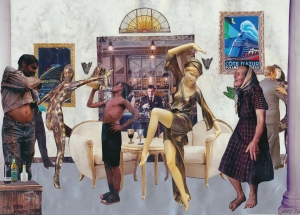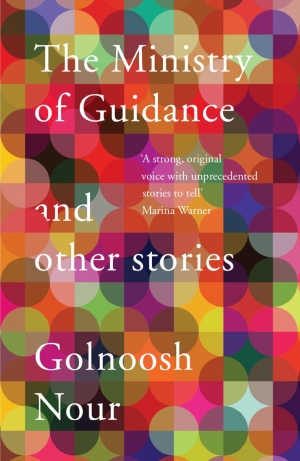
'Most good art is queer': Fran Lock interviews Golnoosh Nour
Fran Lock interviews Dr Golnoosh Nour, who was born in Tehran, about her new book, The Ministry of Guidance and Other Stories. Her debut poetry collection Sorrows of the Sun was published in 2017, and she teaches at Birkbeck College and the University of Bedfordshire.
FL: Thank you so much for agreeing to answer these few questions about your debut collection of short stories, The Ministry of Guidance and Other Stories. I really wanted to do this interview with you because reading the book has initiated in me such a profound period of reflection on notions of queer subjectivity, politics, and nationhood, themes that feel especially relevant and pressing in the current climate.
GN: Thank you for having me, Fran. I’m delighted you found the book so engaging!
It has always seemed bizarre and slightly suspect to me that wherever in the world British or US political interventions are at their most militaristic, swingeing and destructive, we develop a directly proportionate appetite for the literature of those nations. We’ve seen this in Palestine, Afghanistan, in Northern Ireland, and I don’t know if you agree, but I think we’re starting to see it now in Iran. My own feeling is that there is a tendency within publishing, and also within the wider culture, to simultaneously exoticise and assimilate the places and peoples it fixates on. The Ministry of Guidance and Other Stories is such a nuanced book, one that seems to revel in ambivalence and ambiguity. I wonder how conscious you are of writing back against literary culture’s tendency to homogenise and make a fetish of Iran or of some seemingly ‘typical’ Iranian Experience?
Yes, you’re absolutely right, but unfortunately, this is nothing new. Hamid Dabashi and several other Iranian scholars have discussed this issue in depth; since America’s ‘war on terror’, there has been a significant rise in the publication of literature by Iranian women in the West, sometimes to international recognition and praise. These books are often memoir/ nonfiction, and they often have a formula that comfortably confirms the western right-wing narrative of Iran, in which everything Iranian is dreadful and problematic unlike everything western that is ideal and liberating. Farzaneh Milani has coined a term to define this literary subgenre as ‘hostage narrative’. A narrative which offers ‘arrested representations’ that are ‘caged images of reality that is perpetually moving and shifting’. Hostage narrative generalises and simplifies by portraying Iranian women as victims thereby dismissing their contributions to Iranian culture. So yes, I was very aware of this. And the other thing I noticed is that all the characters in these books are heteronormative. So, my book, I hope, is also a reaction against the heteronormative and monolithic portrayals of Iran and its sexualities.
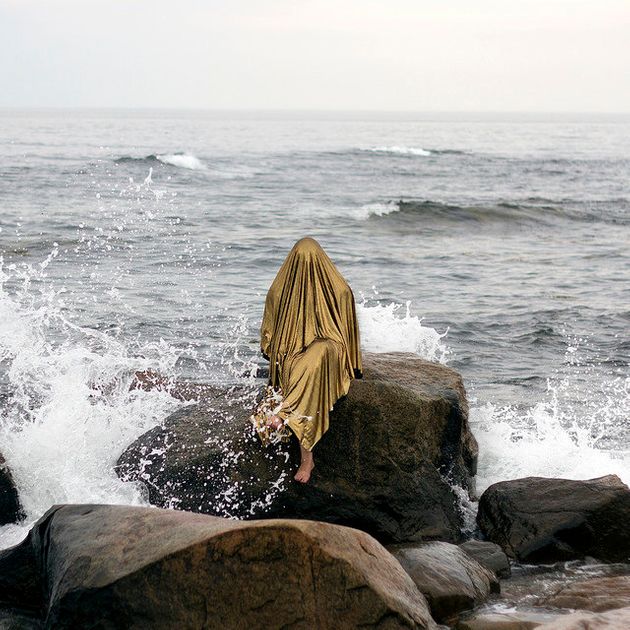
From the series Visiting Thabab, by Nabeela Vega
As a kind of inelegant follow-on to the previous question: one of the joys of this collection is that through the varied subjectivities of your speakers you present an image of Iran, and also of queer identity that is characterised by multiplicity, polyphony and contradiction. How important was the short story form to you as a vehicle for exploring this diversity of voice and experience? And do you perhaps see radical or subversive potential in the short story form as genre? Is there something about it that makes it ideally suited for the transmission of queer narratives in particular?
As you know, the short story is not my favourite literary form. But for this specific book, I felt that it was the most suitable form. Because this book is about representation and I wanted to show as many Iranian queers in depth as possible. And I had many stories to tell about queerness, so I believe these thirteen short stories do the job perfectly well. But also, the famous definition that Sedgwick offers of queerness that queerness is an ‘open mesh of possibilities’ and I have to admit I feel the same way about short story as a form. In this sense, short story as an artform provides a comfortable cradle for queerness.
To stay with the idea of queerness, would you mind speaking briefly about what the notion of queerness means to you, and where you see yourself in terms of building and contouring a modern queer canon?
One of the most wholesome definitions of queerness has been provided by Sarah Ahmed in her seminal book, Queer Phenomenology. She says anything that disrupts is queer and anyone practicing nonnormative sexualities is queer as they disrupt heteronormative structures. I myself identify as queer. And all my protagonists in The Ministry of Guidance and Other Stories are queer. They express a lot of same sex desires, but also other desires that can’t be tamed, labelled, and defined by the mainstream discourses of sexuality. In his essay, Queer Past, Queer Present, Queer Future, Jonathan Kemp says queer is about ‘not simply imitating the norm but exploring alternatives’. And I think this is a great place to start.
I think the queer canon has always existed, in fact, I believe most good art is queer. As for the modern queer canon, there are so many thrilling queer voices, including Saleem Haddad, Alan Hollinghurst, Danez Smith, Joelle Taylor, Ocean Vuong, Jay Bernard, Eileen Myles, Sophie Robinson, Jonathan Kemp, Tomasz Jerdowski, Paul Mendez, Chloe Caldwell, Keith Jarrett, Julia Bell, Jericho Brown, Richard Scott, and of course yourself, and we are just some of the contemporary ones. I think Audre Lorde, Allen Ginsberg, Pier Paolo Pasolini, Forough Farrokhzad, and Iris Murdoch still count as modern queer canon, right? And then a bit further back we have artists like Oscar Wilde and Aubrey Beardsley. So, the queer canon is a never-ending and ever-expanding canon, an open mesh of possibilities, gaps, overlaps, dissonances, and I am floating in it too if I’m lucky.
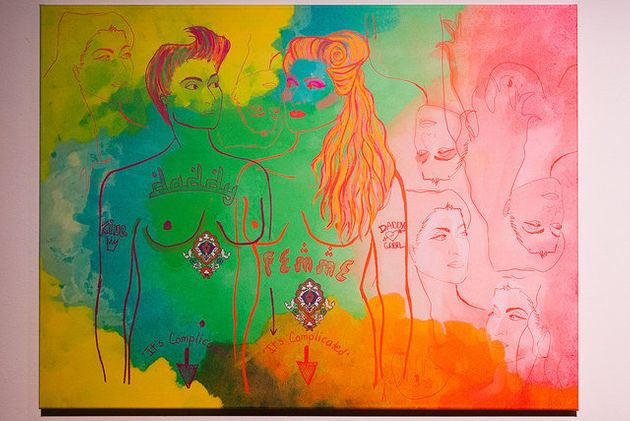
It's Complicated, by Parisa Parnian
At the heart of queerness there is a condition or a feeling of otherness, of being ‘other’. Reading your collection, particularly the stories ‘Soho’ and ‘Oshima’, I am reminded that this is also the feeling that attends exile, the feeling that accompanies being a migrant or a refugee, a stranger in a strange land. I know you’re familiar with the Edward Said quote about exile, that it is ‘the unhealable rift forced between a human being and a native place, between the self and its true home: its essential sadness can never be surmounted’. Your stories intertwine queerness and migrancy in intricate and moving ways, but even when your protagonists are speaking from their native place they often seem divided and estranged. Is there something of the perpetual exile in all of us queers?
Wow, this is such an interesting connection! I love it so much. I think you’re absolutely right in that there is definitely a sense of exile in queerness, especially considering that queerness by its very definition does result in otherness, and being otherised by the society; but partly, it is self-exile too, which isn’t necessarily a sorrowful place. I think there can be joy and strength in exile, in staying away from societal norms, to mock them, to push them away, to question them, to escape them. And to be proactive about it, rather than passively exiled. So, although I agree with Said, that there is sorrow in exile, I also think there is hope and joy in it, too.
Staying with this thought, I do want to stress that this is also a playful collection, full of humour and joy. One of the things that struck me particularly was its attention to moments of solidarity; mutual expressions of friendship and care. Queerness also figures in your work as a scene, a vibrant and nonconforming fellowship, and I wondered how the notion of a queer community – or communities – has shaped your identity as a writer, and conversely, how you think that literature has helped to foster the idea of queer community?
I’m incredibly grateful for the queer communities both in Tehran and in London, not just as a writer but as a nonconformist individual who still needs to survive the heteronormative societies. So, I do think we need communities for our survival and nourishment, at the same time I believe it’s important to know that community is not the only thing we need and it is not enough. Bear in mind, that communities, especially big ones, tend to create their own hierarchies and power structures. So, I think as queers, we also need a lot of solitude, self-love, and individuation. As the great Audre Lorde argues, for queers, especially queers of colour, caring for oneself is a ‘political act of warfare’.
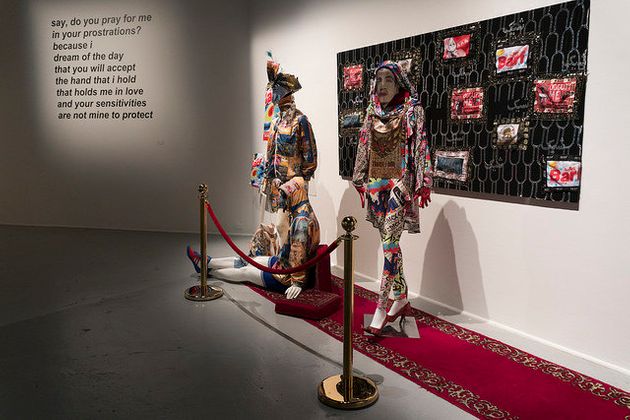
Occupy Me: Topping from the Bottom, by Hushidar Mortezaie
Reading back through these questions it strikes me that they seem quite political in tone, and I find myself wanting to apologise for that because the luxury of not being political is something a number of your protagonists struggle with. I’m thinking particularly of ‘An Evening of Martyrdom’, and reading this story I had in mind something that the American poet Patricia Smith once said, that even if she were to write a poem about meadow flowers it would still be a political act by virtue of the fact that she is a working class black woman in an elite cultural space. Being queer in Iran – being queer in a lot of places – can have very real and very violent consequences, which I think makes it tempting for straight white western audiences to valorise being Iranian and queer as uniquely defiant or ‘brave’, which in itself is a form of violence, a form erasure, in that it ignores the daily negotiations individuals undertake – when to conceal, when to disclose – the oscillation between moments of defiance, and those of fear or of guilt for not being political enough. These tensions are something you handle admirably in your story, and that sense of yearning for a time and place where queer people will be granted the freedom to desire without being crudely politicised. I’d be interested to know if you believe this place and time exists – can ever exist, and how these tensions influence both your choices as a writer, and the way you feel your work is perceived out there in the world?
I agree with Jonathan Kemp that being queer is ‘inherently political’, so no unfortunately there is no escape from politics with capital P during these highly politicised times, where everything is inherently political and politicised, not just one’s sexual identity. There is still a lot of queerbashing in the world, and being queer is still one of the most political positions one can occupy. I’m a bit of an optimist, so I do think, if we keep fighting, there will be a time and place when people can honestly express their nonnormative sexual desires without being bashed or politicised. But at the moment, we have a long way to go. And that’s why, I believe, queer visibility is vital. And I hope I am creating a lot of queer visibility with my literary endeavours as well as by my very existence and day to day survival in an extremely conservative world.
I want to move away from the explicitly queer aspects of your work now to focus on a theme I think is of equal weight and importance. Some of the most poignant and well realised moments in this collection are centred on familial relationships: cousins, brothers and sisters, mothers and daughters, daughters and fathers. I wonder if you could speak a little bit about how your own sense of family has shaped your writing, both the short stories, and your poetry?
I am very close with my family, and I know very well how family dynamics can be beautiful but also intense and even destructive at times. I think I am lucky with my family, because I have a rather unconventional family. My late mother was a powerful philosophy professor from whom I learned how to be unapologetically strong and intellectually ambitious. And my father is an adoring and adorable person who is also a bit of an individualist who doesn’t care much for social conventions. He’s always enjoyed making jam and pickles, sewing, and maths. And I cherish my three siblings, and my amazing niece and nephew. My older brother is also a writer, so we have a nourishing writerly relationship as well as a loving siblinghood.
From an early age, I never really learned to take gender roles very seriously, even though I was born and raised in an extremely gendered country. I could see that my parents didn’t really abide by the usual gender norms and they were just fine and they didn’t try to suffocate my natural tendencies either. They never told me to ‘act like a girl’ or be a certain way because of my gender. For that alone, I shall always be grateful to them. And I think my lack of respect and sometimes acknowledgement of gender roles and gender norms come across quite strongly both in my personality and my writing. And this is just my blood-related family, my partner who is also a writer inspires me a lot, and we’ve fought a lot of homophobia and racism to be together. And as you know, these are also recurring themes in my work.
I mention poetry because it is a constant presence in your stories, from Iranian modernist poets like Forough Farrokhzad to the decadent Romantics like Lord Byron. I feel like I know the answer to this question, but has poetry been a source of solidarity and nourishment for you as a writer? Has it been influential in fostering your own sense of queer identity?
You do know the answer indeed and it is, ‘yes!’. I cannot imagine my life without poetry. My own poetry and as well as other people’s poetry has definitely strengthened me both as a writer and an individual. Audre Lorde is right, for marginalised voices, poetry is a necessity. A method for reclaiming power, and for me it has also been cathartic and inspiring. Also, from a technical point of view, I believe, even prose writers need to learn poetry and read poetry even if they don’t have the desire or urge to write it. Poetry is where language can be at its most polished, its most beautiful, and its most revolutionary. I do not trust writers who say they have no interest in poetry. Poetry is an artform that needs to be understood and engaged with, even if not deployed, if one wants to be any good at literature.
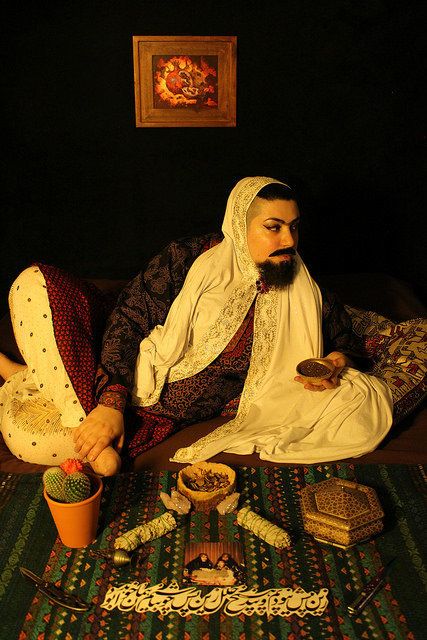
bedoone onvan/untitled, by Kiyaan Abadan
Staying with poetry a bit, I’d like to finish – if you can possibly bear it – with a rather boring question about form. Could you tell me about the role these different forms of writing perform for you, as both writer and reader? How does the process of creation differ across short stories and poetry? Are their things you can say in one, not easily accommodated by the other?
This is not a boring question at all! Quite the opposite.
For me writing short stories and poetry are two very different modes of being. My poetry comes naturally, effortlessly, almost how Wordsworth defines it as a spontaneous overflow of emotion, except that for me there is no ‘tranquillity’ when I’m writing it. My poetry erupts, whereas that is not the case at all with my short stories. I meticulously plot my short stories before writing them. I have an idea, I know exactly what I want. I know the characters, the setting, the protagonist, even the dialogues. I have it all in my head first. Whereas with a poem, I have no idea where it’s taking me, a poem has its own force, direction, and destination, so I just go with it and I know it will take me somewhere cathartic, whereas with my short stories, I tell them exactly where to take me so I have a more active role with them.
Thanks so much for talking to me! I hope that wasn’t too painful.
Thank you for your thought-provoking and intelligent questions. It was a pleasure to answer them.
The Ministry of Guidance and Other Stories is published by Muswell Press and will be available to purchase here from the 2nd April.

